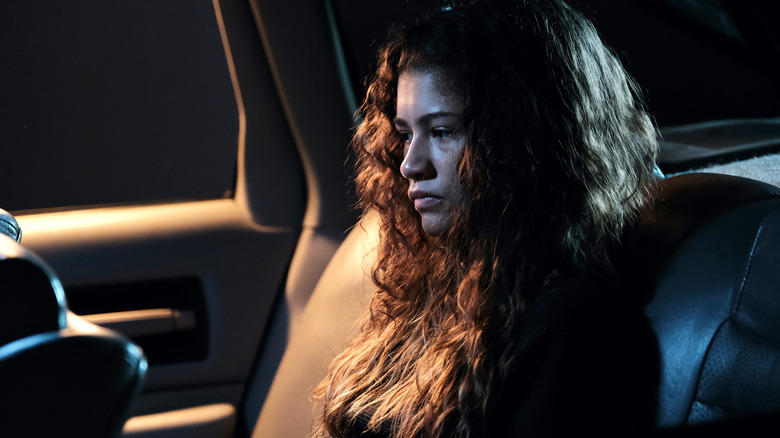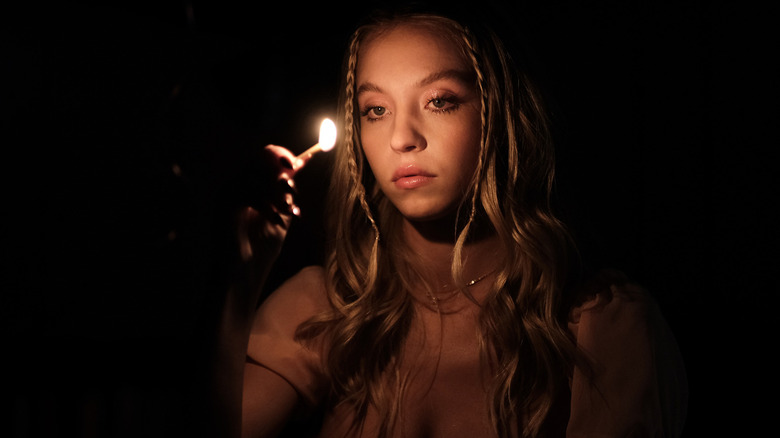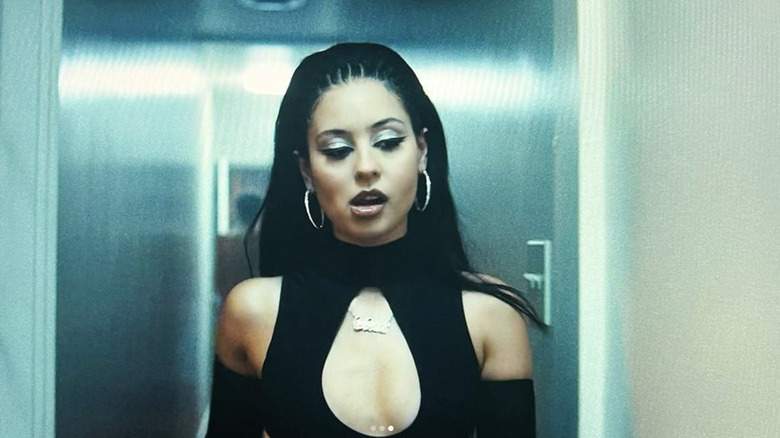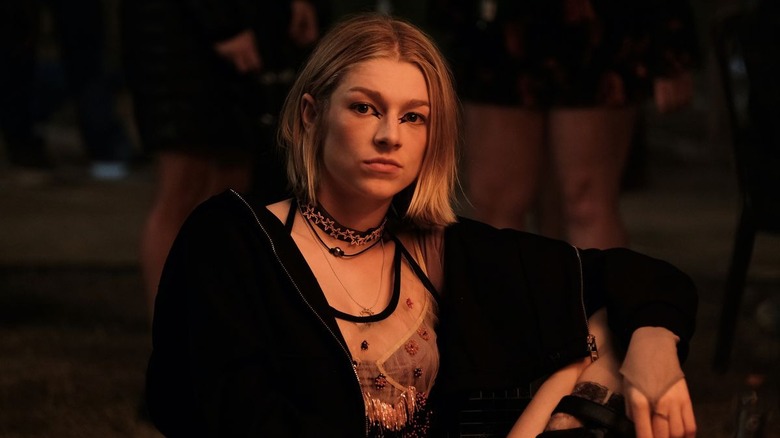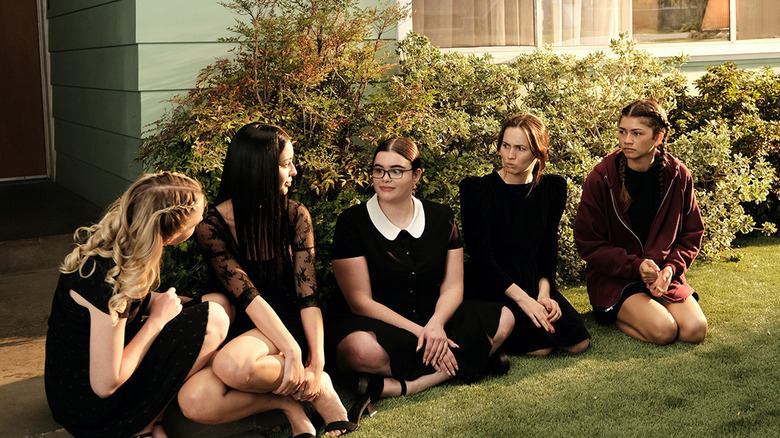Euphoria And What Happens When An Edgy Show Becomes Mainstream
Turns out you don't need superheroes defying the laws of gravity or fire-breathing dragons to get people to watch your programming, you just need highly-stylized melodramatic teenagers and a little bit of controversy. Twitter labeled "Euphoria" as the most-tweeted-about series of the decade, and following the show's second season finale, the discourse surrounding the show is still as spicy as ever.
If you've somehow managed to avoid learning about the troubled teens of East Highland High by cultural osmosis, the gist is that "Euphoria" explores the dramas and traumas of a group of teens, mostly viewed through the perspective of our unreliable narrator, the mentally ill and substance abuse-addicted Rue (Emmy Award winner, Zendaya). While Rue is our main focus, "Euphoria" is rife with other messy and complicated teenage issues typically reserved for "bad influence" characters or "very special episodes" on network TV.
There was some slight hubbub about the show at the end of the first season, but a domino effect of events from the show's debut in 2019 until its return at the end of 2021 turned this teen drama into a cultural phenomenon. Zendaya rightfully became the youngest ever Emmy winner for Best Actress in a Drama Series for her work on the show, while simultaneously starring in "Dune" and as Michelle "MJ" Jones in the record-shattering "Spider-Man" films featuring her real-life romantic partner, Tom Holland. The pandemic may have caused a delay on the second season release, but it helped HBO Max exceed expected subscriber numbers, and prepared to put more eyes on "Euphoria" than ever. Suddenly, "Euphoria" was released from its contained, glitter-lined bubble and exploded onto the mainstream ... and that might not have been a good thing.
The curse of going viral
It feels like the "Euphoria" discourse is rooted in a similar problem we see when a tweet goes viral, thereby "leaving the neighborhood" of the person who originally tweeted it. Once the tweet is viewed outside of its intended audience, all nuance is gone and there's no longer a guarantee that all viewing the tweet are coming from the same viewpoint. This is why an example of the sarcastic practice of LGBTQIA+ members labeling any minor inconvenience as "homophobic" caused a viral "Michael Myers homophobic" tweet following the release of "Halloween Kills" to be written up as if it's not only serious, but newsworthy.
"Euphoria" is not an easy show to digest by any stretch of the imagination, and is frequently dealing with taboo and difficult subject matter that force audiences to interrogate their own moral code, ability to empathize, and in many cases, unpack their own relatable trauma. "Euphoria" takes controversial, confrontational topics and pushes them through a kaleidoscope world of lavish colors and bold production design elements, to varying degrees of success. Nothing about this show is conventional, yet because of its newfound mainstream appeal, a show that was never meant to be relatable is suddenly being held to a standard it never asked for. With "Euphoria" becoming the must-discussed drama of 2022, plenty of people are tuning in because of the show's buzz, and not because it actually appeals to them, as evidenced by the non-stop conservative hand-wringing over its subject matter. Rather than the show finding its audience naturally, it has been thrust into the harsh and unforgiving mainstream spotlight.
Euphoria is not about the universal teen experience, and isn't trying to be
While there's absolutely a conversation to be had regarding the show's portrayal of teen sex and nudity, the discourse surrounding the show's "relatability" has reached critical mass. If "Euphoria" was trying to be some John Hughes-style universal coming-of-age storytelling, it'd be one thing, but it's not. "Euphoria" is not about the average American teen, it's about that small microcosm of students in every high school who are dealing with "adult" issues well before they should be. That experience may be unrealistic for the masses, but it's not out of the realm of possibility. Rather than critique the show for what it's doing and saying, a majority of the discourse surrounding it is based in fandom constructions. One of the best examples of this, as /Film "Euphoria" recapper Valerie Ettenhofer pointed out to me, has been the conflict between Maddy and Cassie.
In case you missed it, Cassie started sleeping with Maddy's ex-boyfriend, Nate, who is also the abusive walking personification of toxic masculinity. For weeks, fans were hyping up the "inevitable showdown" between the two, believing it would result in a violent altercation with Maddy, rightfully, beating the brakes off Cassie. But "Euphoria" is not "The O.C." nor is it "Degrassi." There was a slap, a rolled ankle, and a push into a wall leading to a bathroom discussion acknowledging how bad things were going to get if Cassie continued her relationship. Their conflict was not only about breaking girl-code, it was also about how men try to keep women divided and fight amongst each other, so that they can't join forces and become stronger ... but that conversation was lost in a sea of memes about how the fight should have been more intense because Maddy didn't even break a nail.
Be mad for what the show is and not what it isn't
Make no mistake to anyone reading this, I wasn't super thrilled with "Euphoria" season 2. I firmly believe that Levinson hit his peak with "Assassination Nation" and if it wasn't because I am parasocially invested in the successes of Zendaya, Sydney Sweeney, Hunter Schafer, Barbie Ferreira, Alexa Demie, Maude Apatow, and Angus Cloud, I'd probably be checking out before the third season debuts in *checks notes* 2024. Is there a conversation to be had about how Levinson shoots teen sex? Yes. Does Lexi need to interrogate why part of her healing journey was publicly humiliating her sister? Yes. Were Kat and Jules completely wasted all season? YES!!! These are all valid criticisms to be made, but the issues I have with "Euphoria" are issues that exist for what the show is and not for what the show isn't.
On more than one occasion, I saw people reference the coming-of-age film "Eighth Grade," as sort of the anti-"Euphoria" and wonder why the show doesn't feature actors who look and act less adult and more like the film's protagonist, Kayla. Well, for one thing, "Euphoria" is about a specific clique at school, not the school as a whole. A character like Kayla wouldn't be having "Euphoria" problems, because that's not the life she's leading, and there's nothing wrong with that! But "Euphoria" is not "Eighth Grade" and trying to compare the two is not only a fundamental misunderstanding of the stories each project is trying to tell, but it's also a very narrow view of what defines a coming-of-age story. I was not a Kayla in "Eighth Grade" googling instructions on "how to give a b.j." I was like Kat from "Euphoria," and dishing them out. It's okay to have different growing-up experiences, and one is not "more authentic" than the other.
The pendulum still swings
Twitter claimed the second season brought in over 30 million tweets, a 51% increase compared to the show's first season. Because "Euphoria" is now under this glaring spotlight of mainstream attention, it's also manipulated the way fans of the show interrogate what they're watching. Season 1 of "Euphoria" resonated very deeply with a lot of people. It's normal to feel defensive of something that speaks to you, but a higher volume of viewers frequently equates to a higher volume of criticism. In response, some fans have begun making excuses for the show's shortcomings, almost like a subconscious retaliation for how much hate the show has received this season.
sam levinson gets away with it cuz the kids who love euphoria write their own show in their heads, just out here like “well no, see it’s implied rue stayed at lori’s for days and was trafficked and paid her debt then escaped then it’s implied rue goes to outpatient treatmentâ€
— ashley ray (@theeashleyray) February 28, 2022
The pendulum continues to swing back and forth between a wild binary where "Euphoria" is either the deepest and most brilliant show ever made, or that Sam Levinson is a menace and will bring about the death of all humanity. The nuanced middle is nowhere to be found, and it's a genuine shame.
For as much as "Euphoria" gets wrong, there's so much of it that it gets so, so right. Zendaya should absolutely win another Emmy for her performance in the "Stand Still Like a Hummingbird" episode, and season 2 ended with a ton of plot holes I'm unsure Levinson can fill on his own (Seriously, dude, hire a writer's room. We are literally begging you). We're a long ways away from season 3, but with "Euphoria" now firmly dominating the mainstream conversation, it'll be interesting how the new wave of varied perspectives will impact where the show goes next.
